Sunday, June 1, 2003
DESARME DE LAS POLICÍAS
Caracas 31 de mayo de 2003
Ante el desarme de la policía del Zulia -- para lo cual el régimen CASTRO-COMUNISTA de los señores Chávez y Castro se apoya en el recién firmado e histórico acuerdo entre el oficialismo y la “oposición” -- solamente me cabe recordarles a mis amigos que firmaron y apoyaron tal garabato, lo que aseguraba Don Pepín Rivero (editor y fundador del “Diario de La Marina”, en Cuba):
“Transigir con un comunista es mil veces peor que transigir con un ladrón, sin que con esto quiera yo ofender a los ladrones…”
Con profundo aprecio,
ROBERT ALONSO
Envíen sus comentarios – UNICAMENTE – a robertalonso2003@cantv.net pues los otros buzones colapsan con la cantidad de correo que reciben. -- SOLAMENTE RESPONDEREMOS CORRESPONDENCIA ENVIADA A NUESTRO SERVIDOR DE CANTV
LO MAS RECIENTE QUE HE PUBLICADO EN ESTE PORTAL
DE MI MISMA AUTORÍA
PORTAFOLIO VIRTUAL DE ARTÍCULOS Y ENSAYOS DEL MISMO AUTOR
LA DIETA ATKINS
En mis años mozos había una dieta fabulosa – que llevó a la muerte cardiaca a más de uno – llamada “LA ATKINS”, diseñada por el médico norteamericano Robert Atkins, la cual consistía en ingerir grandes cantidades de proteínas y un mínimo de carbohidratos. La razón que esgrimía este médico era muy sensata: al organismo se le hace más fácil consumir carbohidratos que proteínas, en consecuencia – si se le da la opción -- vive de los carbohidratos y almacena las proteínas, razón por la cual uno engorda como un sapo. Por el contrario, si se obliga a nuestro organismo a consumir grasas (proteínas) y casi cero carbohidratos, no le queda otra opción que comenzar a tomar prestado de nuestras reservas lo requerido para poder subsistir “sanamente” y uno se pone flaco como una culebra… y termina muriéndose como un pendejo.
No es que “LA GUARIMBA” sea el último sacrificio antes de decirle adiós a la humanidad, pero requiere de un pequeño esfuerzo. Entre sus bondades, sin embargo, está aquella de hacerla accesible a todos los grupos sociales, edades y estados físicos. Es tan bondadosa y amplia que les ofrece la oportunidad a los ciudadanos de la tercera edad de luchar por todo lo que construyeron durante sus productivas vidas y a no ser para sus hijos y nietos una lastimosa carga en el destierro o morirse de tristeza mirando al piso en la patria que ellos – para bien o para mal -- nos dejaron de herencia. Los minusválidos pueden hacerle un gran aporte a la sociedad y a la patria “guarimbeando”. Sin embargo, no deja de requerir de un mediano esfuerzo.
Si a la sociedad civil organizada se le vende la “teoría colominiana” en la cual se asegura que Chávez está guindando de un gajo, cual mango casi podrido y – para rematar – se le mete el embuste que con el referendo revocatorio el Sr. Chávez saldrá de la presidencia como corcho de limonada, el común de la gente escoge la opción TOTALMENTE PASIVA antes de ponerse a “guarimbear”, algo así como sucede con el organismo cuando se le da la opción de quemar carbohidratos o proteína, pues el único esfuerzo – en todo caso – sería ponerse en cola para votar o, aún mejor, esperar que el gajo se reviente y “el mango” caiga solito de platanazo. El problema está en que tal vez ni siquiera el hombre esté verde y este régimen no nos dé la oportunidad de llegar al referendo.
Todavía se pretende “achinchorrar” más a la sociedad civil desorganizada, haciéndole creer que ahora, con esto del “ACUERDAZO”, ya todos vamos a vivir felices cual lombrices y colorín, colorao… aunque el cuento no se ha acabao, pronto terminará el drama: el régimen nos respetará, no nos caerán más a tiro, los “círculos del terror” y los malandros serán desarmados, Carter velará por lo inmaculado del referendo revocatorio que sacará a Chávez como corcho de limonada, lo haremos preso, lo juzgaremos por delito de lesa humanidad y lo enviaremos – para siempre – a la celda de al lado del Sr. Milosevic; los “Tupamaros” y los “Carapaimas” guindarán sus pasamontañas y se meterán a boy scouts, se acabará la inseguridad ciudadana, el dólar bajará a Bs. 60, habrá harina pan como arroz partido – o “pa’tirar pa’rriba”, como diría Agatilla -- y al “presidente” Gaviria le darán el Premio Novel de la Paz, el cual – de motus propio – compartirá con el ciudadano Elías Santana.
Sin embargo, los expertos nacionales e internacionales, oficiales activos y retirados de nuestro Ejército forjador de libertades y de otros ejércitos del mundo con los cuales he hablado sobre “LAGUARIMBA”, me garantizan – TODOS – que una acción así (llevada a cabo adecuadamente) tumbaría al incipiente régimen CASTRO-COMUNISTA de los señores Chávez y Castro en una tarde -- ¡en una tarde! -- siempre que no sigamos “autoguaraleándonos” mucho en el tiempo. De hecho, algo similar, fortuito y a mucha menor escala lo tumbó ya el 11 de abril de 2002 sin que nosotros nos diéramos cuenta.
Y ustedes entonces se preguntarán qué estamos esperando. La respuesta es muy sencilla: estamos esperando un líder que la convoque. No será fácil porque quien recoja la bandera de “LA GUARIMBA”, la convoque y el pueblo no le haga caso, se quemará políticamente. Ese es el grave problema de los políticos de oficio. Es más fácil montarse en el “autoguaraleo” e “ir tocando el piano de oído” que lanzarse a la tarea de liderizar a todo un pueblo para que en perfecta cohesión se lance a “LA GUARIMBA” cerrada y pareja.
Aquellos políticos que se montaron en el tren del “ACUERDAZO” se acordarán de sus respectivas fechas de nacimiento cuando el pueblo se dé cuenta de la soberana tomada de pelo que les han echado a todos ellos. Hoy sus acciones pudieran estar en el pico de su valor, pero les garantizo que caerán estrepitosamente como una máquina de escribir desde el “pent house” de un rascacielos cuando ese acuerdo en pleno se convierta en sal y agua, dentro de unos diítas…
Claro que todavía no podemos ponernos a convocar “LA GUARIMBA” porque su tiempo no ha llegado aún. Por una parte, esa sociedad civil engatusada se atiborra hoy con los “carbohidratos” del “ACUERDAZO”, pero no nos olvidemos que la constitución nos OBLIGA a defender la democracia ante un régimen forajido. “LA GUARIMBA” se justificaría CONSTITUCIONALMENTE de llegar elmomento. Digamos que si a este régimen le diera por regalarle petróleo a una tercera nación, o meterle mano al FIEM… o instaurar un control de cambio sin la aprobación de la Asamblea, desconocer los convenios internacionales como el ALADI, por ejemplo… se estaría poniendo al margen de la constitución. Entonces, SOLO ENTONCES, tendríamos la fuerza moral, cívica, legal y CONSTITUCIONAL de convocarla… si tuviéramos un líder.
ROBERT ALONSO
robertalonso2003@cantv.net
Envíen sus comentarios – UNICAMENTE – a robertalonso2003@cantv.net pues otros buzones colapsan con la cantidad de correo que reciben. Se envía el mismo escrito vía “anexo” en caso de fallas técnicas.
LO MAS RECIENTE QUE HE PUBLICADO EN ESTE PORTAL
DE MI MISMA AUTORÍA
PORTAFOLIO VIRTUAL DE ARTÍCULOS Y ENSAYOS DEL MISMO AUTOR
Liberté, Egalité, Fraternité—and Segway
<a href=slate.msn.com>slate.msn.com, Friday, May 23, 2003, at 9:12 AM PT
Not everyone at Notre-Dame embraces the concept of the Segway.Paris is a walker's city, built for sauntering, window-shopping, the sideways topple into the cafe chair. On our final day here, we finally realized that the best way to get around on Segways is to use the bike lane rather than the sidewalk. The ride is fast and uncluttered, and you aren't constantly giving pedestrians heart attacks. Technically, Segwaying in the street is illegal, but the policemen who stared us down at intersections and in front of President Chirac's house all seemed to be following the same penal-code decision tree ("Not a bicycle, yet has two wheels and moves in a leisurely manner: ALLOW TO PROCEED").
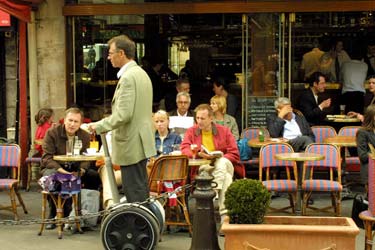 Our belated epiphany came courtesy of David Mebane, the owner of Mike's Bike Tours, which conducts bicycle tours of the city. (Yes, he knows it should be called David's Bike Tours; long story.) David, an easygoing 27-year-old Texan, led us around Paris for four hours on his Schwinn as we followed on our Segways, "Make Way for Ducklings"-style. Every once in a while he would stop, lean over the handlebars, and explain something: "Marie Antoinette's head was lopped off in the place there, totally decapitated by the guillotine"; "If you go over to the third window to the right of that arch of the Louvre, you can look in and see the Venus de Milo for free"; "Down there in the Hôtel des Invalides, my favorite building in Paris, so beautiful when it's all lit up at night, the French resistance built a false ceiling in the dome—just below that second level of windows. They hid U.S. airmen who'd been shot down, bomber crews and so on, between the two ceilings."
Our belated epiphany came courtesy of David Mebane, the owner of Mike's Bike Tours, which conducts bicycle tours of the city. (Yes, he knows it should be called David's Bike Tours; long story.) David, an easygoing 27-year-old Texan, led us around Paris for four hours on his Schwinn as we followed on our Segways, "Make Way for Ducklings"-style. Every once in a while he would stop, lean over the handlebars, and explain something: "Marie Antoinette's head was lopped off in the place there, totally decapitated by the guillotine"; "If you go over to the third window to the right of that arch of the Louvre, you can look in and see the Venus de Milo for free"; "Down there in the Hôtel des Invalides, my favorite building in Paris, so beautiful when it's all lit up at night, the French resistance built a false ceiling in the dome—just below that second level of windows. They hid U.S. airmen who'd been shot down, bomber crews and so on, between the two ceilings."
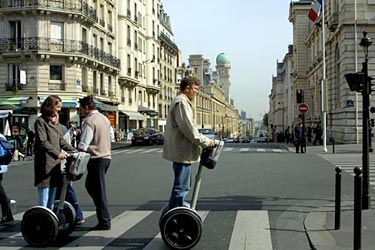 He had the patient manner of someone who must explain to American visitors, several times a day, why the ATMs here don't dispense dollars. While an implacable enemy of French bureaucracy, he loves the French and their history. At Place Clemenceau, he wheeled up beside a dark green statue of Charles de Gaulle and said, "Little World War II story. Obviously, de Gaulle was leading the Gaullist resistance, but there was also a Communist resistance, and when the Allies took Paris back there was a void of power—who's going to take over? August, 1944, de Gaulle flies in from London to take command but gets extremely low on fuel, it's a near thing, is he going to make it?" I guessed that he would. "He lands with nothing in the tank," David continued, "then walks down the Champs Elysées in a big parade with all the soldiers and citizens, from the Arc de Triomphe to Notre-Dame, with German snipers on rooftops taking potshots at him, whatever, craziness, but nobody hits him and he takes the keys to the city. There's just this tremendous celebration of liberation."
He had the patient manner of someone who must explain to American visitors, several times a day, why the ATMs here don't dispense dollars. While an implacable enemy of French bureaucracy, he loves the French and their history. At Place Clemenceau, he wheeled up beside a dark green statue of Charles de Gaulle and said, "Little World War II story. Obviously, de Gaulle was leading the Gaullist resistance, but there was also a Communist resistance, and when the Allies took Paris back there was a void of power—who's going to take over? August, 1944, de Gaulle flies in from London to take command but gets extremely low on fuel, it's a near thing, is he going to make it?" I guessed that he would. "He lands with nothing in the tank," David continued, "then walks down the Champs Elysées in a big parade with all the soldiers and citizens, from the Arc de Triomphe to Notre-Dame, with German snipers on rooftops taking potshots at him, whatever, craziness, but nobody hits him and he takes the keys to the city. There's just this tremendous celebration of liberation."
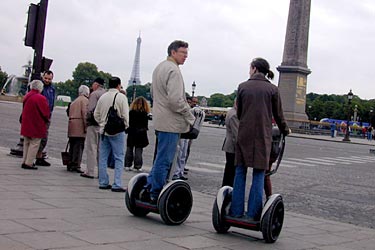 Amanda looked up at de Gaulle in his uniform and kepi. "He looks like he belongs in Singin' in the Rain," she said. The figure did look rather as if it were beginning to pirouette and break into song.
Amanda looked up at de Gaulle in his uniform and kepi. "He looks like he belongs in Singin' in the Rain," she said. The figure did look rather as if it were beginning to pirouette and break into song.
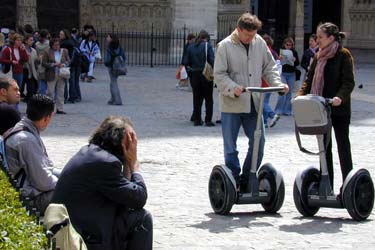 "Or like the Morton Salt girl," David said.
"Or like the Morton Salt girl," David said.
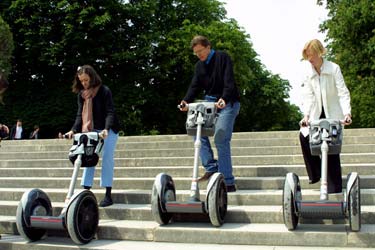 It was a sunny day at last, and all Paris seemed to be out and in a cheerful mood. It might well have just been coincidence, but cultural understanding of the Segway seemed to have seeped into the collective consciousness. On our first day here no one knew what the machine was, but today four different people seemed to know all about the Segway and its gyroscopes and began explaining it to other bystanders as we talked nearby.
It was a sunny day at last, and all Paris seemed to be out and in a cheerful mood. It might well have just been coincidence, but cultural understanding of the Segway seemed to have seeped into the collective consciousness. On our first day here no one knew what the machine was, but today four different people seemed to know all about the Segway and its gyroscopes and began explaining it to other bystanders as we talked nearby.
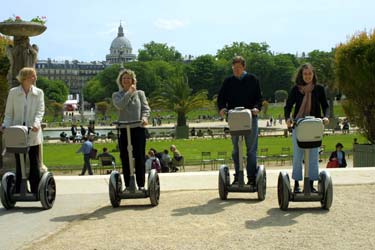 As we slalomed around I.M. Pei's glass pyramid in the Louvre's courtyard, a photographer who shoots Polaroid photos of tourists there at 6 euros a snap began asking rapid-fire questions. A short, intense man in a red windbreaker, he was curious about the Segway's range. When I said that it was 17 to 25 kilometers, he frowned and seemed to take against the whole idea. "But that's nothing," he said. "Paris is very large—what can you do with 20 kilometers? You can't get to the office and back!"
As we slalomed around I.M. Pei's glass pyramid in the Louvre's courtyard, a photographer who shoots Polaroid photos of tourists there at 6 euros a snap began asking rapid-fire questions. A short, intense man in a red windbreaker, he was curious about the Segway's range. When I said that it was 17 to 25 kilometers, he frowned and seemed to take against the whole idea. "But that's nothing," he said. "Paris is very large—what can you do with 20 kilometers? You can't get to the office and back!"
David took up the cudgels. After riding the Segway in the courtyard, he had decided that he wanted one for leading his tours. "You can always recharge. It takes no time." (Well, five or six hours.)
"Four hours of use before you need to recharge, it's nothing," the photographer said. "My cell phone has a five-hour charge! And whose boss will let them charge the machine at the office?"
"The Segway engineers are working on extending the battery life," David said, which is true, but he was winging it. "The newest technology, magnesium—" he looked at me.
"Cadmium," I said, not entirely sure if that was what you use for batteries or enemas.
"Cadmium," David repeated confidently. "All the problems will be solved. Now, if this machine were a little cheaper and had a larger range, would you be interested?"
The photographer lowered his sunglasses and looked at it again, up and down, then broke into a charming smile. "It is very interesting," he said. "Very."
After we wound through the crooked streets of the Marais and had some superb sandwiches at Lina's, just off the rue de Rivoli, I noticed that my battery indicator was getting low. Halfway up the Champs Elysées, it indicated that I had no reserve at all, and as we were entering the home stretch on rue de Bassano, the user interface screen begin flashing red: nothing in the tank! My Segway was slowing, creeping, humming just a little: Would I make it?
I guessed that I would. And indeed I coasted up to the front door of the hotel with nothing in the tank. There was no tremendous celebration of liberation, just a chance to get off and recharge and think happy thoughts about the imminent possibility of dinner. The French helped liberate us in 1776, we returned the favor later, and now both countries are free to be provoked and intrigued by each other and to disparage each other's wine.
Amanda had been following right behind me to give me a push if necessary. "Liberté, Egalité, Fraternité—and Segway," she said.
It's a Good one: News from the people--oh my!
By Rupert Goodwins
<a href=msn.com.com>MSN.com-ZDNet (UK)
May 20, 2003, 8:27 AM PT
COMMENTARY: London--Referendums are everywhere. We'll soon find out whether Tony Blair will be asking us to vote on the euro; meanwhile, it's a full-time job these days watching television and deciding which celebrity to eject, which poem is finest or whether surfing horses make a better advert than potato-eating Martians.
We can e-mail, text or phone our choices in from the sofa, while the government is dead keen on introducing similar electronic voting for less important decisions such as national and local elections. Truly, the voice of the people is loud across the land.
Yet we've never felt more detached from the mechanisms of state. Everyone knows that the euro vote will only happen when Tony's sure of the outcome, and the biggest demonstrations the country has ever seen made not a scrap of difference to the Iraq adventure. It's a commonplace that democracy doesn't work without an informed electorate, so perhaps some of this cynicism is reflected in the slow demise of the newspaper industry--felt most keenly by those parts of the press that take themselves most seriously as organs of truth. People don't trust journalists, and it's hard to escape the feeling that a lot of the media repays the compliment.
Our new technologies were supposed to remove these sorts of barriers, but attitudes harden instead: online media discussion groups turn into cliques, suspicious of outsiders and proud of their prejudices. In the US, the world's poster child for the glorious Internet revolution, it's even worse: patriotism and sectarianism are the order of the day, while the old leaders of the traditional high-tone press are in spasms of self-doubt. The New York Times' recent public self-flagellation over its rogue reporter has been met with raucous laughter, while huge stories go unreported. For anyone who believes in the necessity of a healthy, diverse and skeptical press as a guard against abuses of power, these are worrying times.
But where to look?
Try South Korea. A phenomenally successful experiment in new media--it actually makes money--called OhmyNews has been blossoming for four years. As an exclusively Korean-language publication, it's remained beneath the radar in the Western media (Thanks to Dan Gillmore of the Mercury News for pointing it out). But it's making the agenda in its home country, where it is widely held to have helped the election of a reformist presidential candidate.
Like all good news sources, it comes as both a weekly paper and constantly updated Web site, with the weekly publication using the best parts of the site. But unlike any other news source, it's largely written by its readers or 'citizen-reporters' as they're known. Anyone can submit contributions to the Web site; the articles the people write are scrutinized by the permanent staff and rated before publication. Of the 200 or so submitted daily, around 140 make it onto the site.
The more the editors like a story, the higher its position on the site, the better its chances of making the paper and the more money the contributor gets--although since the top payment is around £15, nobody's retiring early yet. That's good enough for the 15,000 people who've got their bylines into OhMyNews, a pool of contributors hundreds of times bigger than any paper you'll read.
And while the paper version is mostly written by the staff journalists, the leads they get from their contributors are invaluable. With hit rates as high as 20 million--in a country of 40 million--the readers who don't write seem just as keen as those who do.
Some of the credit for the publication's success goes to the South Korean policy of aggressively introducing broadband across the nation. It's also been helped by the lack of diversity in newspapers prior to its launch. But it's also earned its spurs by running with serious stories the other outlets didn't cover, as well as creating that bond with its readers that all newspapers need by the simple method of printing things that matter to them on a personal level.
OhMyNews doesn't abdicate the important editorial principle of filtering and ranking the news--somewhere that other online quasi-journalistic phenomena such as blogs fall down--rather, it underlines the unfashionable idea that the best quality news comes from the widest possible input. People trust it, and use that trust to take part in the national debate that has to be at the heart of democracy. Not bad for an organization with a staff of 50.
We desperately need to repeat the experiment, here and in the United States. Pure grass-roots activism is too easy to ignore, while the mainstream media still sees its readers as circulation fodder--demographics to be placated or inflamed. Whoever takes on the task can take pride in their role in reinvigorating democracy at an important time, in helping to recreate a vibrant national community and in demonstrating the strengths of new technology--and did I mention that it makes money? I'd vote for that.
Saturday, May 31, 2003
The Age of Villages by Alfredo Toro Hardy
<a href=www.vheadline.com>Venezuela's Electronic News
Posted: Wednesday, May 28, 2003
By: Alan Large
British educationalist Alan Large writes: In the autumn of 2002 I traveled to London with three students from the school where I teach in Lincolnshire, England. William, Hafiza and Toni were about to become the “Britkidz” whose visit to Venezuela was to be a feature in VHeadline.com some weeks later. We were to meet the Venezuelan Ambassador to the UK, Alfredo Toro-Hardy ... the embassy was an elegant, though slightly jaded, house of Georgian origins that stared across the busy road to the Natural History Museum in West London.
Our entry into the embassy and brief wait set the scene for the meeting with the Ambassador. We were greeted in a warm and slightly informal manner and sat in comfy leather sofas as we waited for our meeting with the Ambassador. I had only met one Ambassador before this ... an American who was trying to balance his official duties with a natural flair for taking an interest in those whom he encountered. The result was a paradox, someone who you could engage with, but not enough time to make it worthwhile ... he moved on to the next engagement having barely scratched to surface of the first.
We were shown into the Ambassador’s study. “Good morning, sir” (I’m not comfortable with official titles, and “Your Excellency” didn’t seem to fit the building or the room which was both business-like and friendly at the same time). Just for a second, I thought my family doctor had a new post as Venezuelan Ambassador, but perhaps it was just his long-lost older brother. Having overcome the surprise of the visual, I found the man and the embassy were one and the same: business-like and friendly. For about fifty minutes we had the undivided attention of an obviously intelligent and educated man who has a deep-rooted commitment to his country and who has the communication skills to ensure his “mixed ability” audience (of a disengaged student, one with a bubbly personality, a would-be sophisticate and a balding teacher) were both entertained and educated about his homeland and his role as Ambassador.
So why this long introduction?
Simply that it sets in context the man and his book: Reading Alfredo Toro Hardy’s book “The Age of Villages” was a similar experience, and was no surprise to me. The book covers a vast range of modern issues, it puts across its message quietly and effectively, and provides that same experience I had in visiting the Ambassador in London ... I came away from the embassy (and the book) better informed than before either encounter. I had not been force-fed in either encounter but gently and persuasively led along new paths.
At university, more years ago than I am prepared to admit, I was lectured by those who had masses of facts to impart and others who knew their facts but could paint the bigger picture. Sometimes it is easy to get lost in the facts but in “The Age of Villages” Alfredo Toro Hardy navigates his way through these with the astuteness of one who has not only educational pedigree but also the experience of world events at the sharp-end. Undergraduates will welcome the clarity of clearly defined hierarchies (… ”in first place … at the regional level…”). The references to other authorities, briefly quoted to add weight to the smooth-flowing commentary, but students will need to read this book fully as there is no index by which specific issues can be pin-pointed.
“The Age of Villages” is a comfortable read ... it may be my own prejudices which create this “comfort zone” but I found myself both agreeing with much (and feeling a little smug, “that’s what I thought”). The carefully constructed line of argument has a smooth logic which, to readers such as myself, who have too little time to keep up with everyday demands, let alone read about world events, will find satisfying as we are led through a maze of different influences which are shaping the world around us.
Toro Hardy allows the reader to get to grips with the contradictory forces of globalization and increasing local pre-occupations.
As I see and experience the impact of refugees moving in greater numbers into my home town, through reading this book I gain greater insight into why this is happening ... and possibly more importantly ... why I and many friends feel the way we do about such issues.
I would struggle to explain this to a wider audience ... Toro Hardy does this by bringing together a multitude of factors, each clearly explained. These build up into as full a picture as non-specialists such as myself can cope with, and yet make the reader feel they are not ignorant of the wider world. To achieve this broadening of horizons whilst staying within a “comfort-zone” is to be applauded.
In conclusion “The Age of Villages” seems a very good read, but there are a few issues to take up. In providing the reader with clarity and order Toro Hardy could be criticized for taking away the need to think and judge for one’s self. The nature of the subject matter means the book was out-of-date before it was published ... we now know the USA’s response to Saddam’s Iraq and the outcome of that war. Perhaps some editor with an eye to quality commentary and comment on the “big world picture” will entice the author to contribute to a regular column ... students of current affairs and those who seek a thoughtful perspective on our fast-changing world would be well-served by more of Alfredo Toro Hardy’s gentle but incisive writings.
Alan Large
Alan.Large@queen-eleanor.lincs.sch.uk
 Our belated epiphany came courtesy of David Mebane, the owner of Mike's Bike Tours, which conducts bicycle tours of the city. (Yes, he knows it should be called David's Bike Tours; long story.) David, an easygoing 27-year-old Texan, led us around Paris for four hours on his Schwinn as we followed on our Segways, "Make Way for Ducklings"-style. Every once in a while he would stop, lean over the handlebars, and explain something: "Marie Antoinette's head was lopped off in the place there, totally decapitated by the guillotine"; "If you go over to the third window to the right of that arch of the Louvre, you can look in and see the Venus de Milo for free"; "Down there in the Hôtel des Invalides, my favorite building in Paris, so beautiful when it's all lit up at night, the French resistance built a false ceiling in the dome—just below that second level of windows. They hid U.S. airmen who'd been shot down, bomber crews and so on, between the two ceilings."
Our belated epiphany came courtesy of David Mebane, the owner of Mike's Bike Tours, which conducts bicycle tours of the city. (Yes, he knows it should be called David's Bike Tours; long story.) David, an easygoing 27-year-old Texan, led us around Paris for four hours on his Schwinn as we followed on our Segways, "Make Way for Ducklings"-style. Every once in a while he would stop, lean over the handlebars, and explain something: "Marie Antoinette's head was lopped off in the place there, totally decapitated by the guillotine"; "If you go over to the third window to the right of that arch of the Louvre, you can look in and see the Venus de Milo for free"; "Down there in the Hôtel des Invalides, my favorite building in Paris, so beautiful when it's all lit up at night, the French resistance built a false ceiling in the dome—just below that second level of windows. They hid U.S. airmen who'd been shot down, bomber crews and so on, between the two ceilings."
 He had the patient manner of someone who must explain to American visitors, several times a day, why the ATMs here don't dispense dollars. While an implacable enemy of French bureaucracy, he loves the French and their history. At Place Clemenceau, he wheeled up beside a dark green statue of Charles de Gaulle and said, "Little World War II story. Obviously, de Gaulle was leading the Gaullist resistance, but there was also a Communist resistance, and when the Allies took Paris back there was a void of power—who's going to take over? August, 1944, de Gaulle flies in from London to take command but gets extremely low on fuel, it's a near thing, is he going to make it?" I guessed that he would. "He lands with nothing in the tank," David continued, "then walks down the Champs Elysées in a big parade with all the soldiers and citizens, from the Arc de Triomphe to Notre-Dame, with German snipers on rooftops taking potshots at him, whatever, craziness, but nobody hits him and he takes the keys to the city. There's just this tremendous celebration of liberation."
He had the patient manner of someone who must explain to American visitors, several times a day, why the ATMs here don't dispense dollars. While an implacable enemy of French bureaucracy, he loves the French and their history. At Place Clemenceau, he wheeled up beside a dark green statue of Charles de Gaulle and said, "Little World War II story. Obviously, de Gaulle was leading the Gaullist resistance, but there was also a Communist resistance, and when the Allies took Paris back there was a void of power—who's going to take over? August, 1944, de Gaulle flies in from London to take command but gets extremely low on fuel, it's a near thing, is he going to make it?" I guessed that he would. "He lands with nothing in the tank," David continued, "then walks down the Champs Elysées in a big parade with all the soldiers and citizens, from the Arc de Triomphe to Notre-Dame, with German snipers on rooftops taking potshots at him, whatever, craziness, but nobody hits him and he takes the keys to the city. There's just this tremendous celebration of liberation."
 Amanda looked up at de Gaulle in his uniform and kepi. "He looks like he belongs in Singin' in the Rain," she said. The figure did look rather as if it were beginning to pirouette and break into song.
Amanda looked up at de Gaulle in his uniform and kepi. "He looks like he belongs in Singin' in the Rain," she said. The figure did look rather as if it were beginning to pirouette and break into song.
 "Or like the Morton Salt girl," David said.
"Or like the Morton Salt girl," David said.
 It was a sunny day at last, and all Paris seemed to be out and in a cheerful mood. It might well have just been coincidence, but cultural understanding of the Segway seemed to have seeped into the collective consciousness. On our first day here no one knew what the machine was, but today four different people seemed to know all about the Segway and its gyroscopes and began explaining it to other bystanders as we talked nearby.
It was a sunny day at last, and all Paris seemed to be out and in a cheerful mood. It might well have just been coincidence, but cultural understanding of the Segway seemed to have seeped into the collective consciousness. On our first day here no one knew what the machine was, but today four different people seemed to know all about the Segway and its gyroscopes and began explaining it to other bystanders as we talked nearby.
 As we slalomed around I.M. Pei's glass pyramid in the Louvre's courtyard, a photographer who shoots Polaroid photos of tourists there at 6 euros a snap began asking rapid-fire questions. A short, intense man in a red windbreaker, he was curious about the Segway's range. When I said that it was 17 to 25 kilometers, he frowned and seemed to take against the whole idea. "But that's nothing," he said. "Paris is very large—what can you do with 20 kilometers? You can't get to the office and back!"
As we slalomed around I.M. Pei's glass pyramid in the Louvre's courtyard, a photographer who shoots Polaroid photos of tourists there at 6 euros a snap began asking rapid-fire questions. A short, intense man in a red windbreaker, he was curious about the Segway's range. When I said that it was 17 to 25 kilometers, he frowned and seemed to take against the whole idea. "But that's nothing," he said. "Paris is very large—what can you do with 20 kilometers? You can't get to the office and back!"